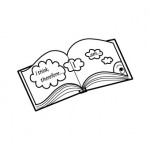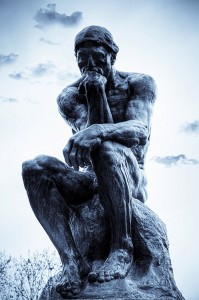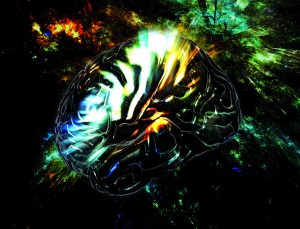MONDAY, 3 MAY 2010
Distinguishing thought from consciousness is a perfect example of the chicken-and-egg scenario. Take a moment to recall an occasion when you were conscious without a single thought in your mind, or when you truly thought about something while deep in an unconscious sleep-like state. You probably will not be able to. Thought and consciousness exist in many forms and, in their widest context, seem to be inseparable. So does our ability to think stem from being conscious, or are we conscious because of our ongoing thoughts?There has been a sudden burst of interest among neuroscientists to foray into unexplored territories of human behaviour. Phenomena such as thoughts, feelings, emotions and consciousness have long been seen as complex functions, central to ‘being human’. These topics were widely discussed amongst philosophers, until Koch and Crick (of the famed Watson-Crick duo) argued in the early 1990s that ‘consciousness’ needed a definitive scientific explanation. But what exactly is it that needs explaining?
In his landmark book The Conscious Mind, David Chalmers distinguishes between two types of consciousness: psychological and phenomenal. The first involves brain functions such as memory, learning, and processing, whilst the other is responsible for the unique kind of ‘feelings’ or ‘experiences’ that are associated with some sensory responses. Brain functions like awareness and attention bridge the two categories. For example, you need to be both attentive and aware in order to learn in a classroom (psychological), or simply to enjoy the brightness of the sunshine outside (phenomenal).
While reading a book, our mind often wanders and, although we keep reading, we don’t exactly comprehend that particular paragraph’s content. This is a classical case of inattentive consciousness, where although we are processing the conscious experience of reading, our thoughts seem to lead our attention away. Only once we become aware that our mind has wandered do our thoughts return us to the book. But how do scientists define thoughts?
Thought is broadly defined by anything involving creativity, novelty, imagination, mind-wandering, daydreaming, decision-making and everyday-planning. People experience at least two broad types of thought: spontaneous thought such as an unprovoked desire to read a book, and directed thought such as deciding which book to read. It has been proposed that thought begins with an external sensing of the environment that feeds back to the brain and in turn results in internal stimulation. This is possibly why thoughts can stimulate various actions and behaviour. The internal feedback is also often used to explain the ‘inner world’ experience – the commonplace feeling that our subjective filtering processes are as dynamic as the world around us.
Since thoughts constitute the core of both awareness and attention, there is an obvious connection between the various types of thought and both types of consciousness. But does thought or consciousness come first? Whilst it may initially seem easy to imagine scenarios to segregate thought from consciousness, often this is impossible. For example, as we gradually relax from alertness towards sleep, our thoughts decrease and degrade, seemingly in response to the changing level of consciousness. However, if we are stressed and preoccupied with thoughts, these can arouse consciousness, interfering with our ability to sleep, resulting in insomnia. These contradictions capture perfectly the chicken-and-egg situation.
In some cases, it appears that attentive thoughts can modify consciousness. This leads to disparity between what our senses tell our brains and what our brains tell ‘us’. Take magic tricks; although an object’s image may be fully formed in the visual cortex of our brain, we don’t ‘see’ it due to the magician’s ability to distract us. In other words, the audience is forced to direct their attentive thoughts away from that particular object. Vice versa, we can find ourselves consciously doing something different from what we were thinking of doing. Since thoughts drive most, if not all, voluntary actions, knowing what drives thought will yield useful information on free will, and whether humans have it.
Regardless of which comes first, it seems clear that thought and consciousness are tightly intertwined. Or are they? Recent findings in cognitive neuroscience suggest that the two phenomena might not be as interconnected as we think. In one study it was found that intelligent decision-making was most effective if a short period of distraction was introduced. This suggests that unconsciousness plays a role during the distraction period, and helps the human goal-directed thought process. Interestingly, in a recent experiment where subjects had to make a decision and act accordingly, the volunteers unconsciously processed their decisions in their brains up to ten seconds before they consciously knew about their own decision. Such ‘paranormal’ findings have led to a recent surge in consciousness research.
Understanding the interconnection between thought and consciousness is not only important from a scientific point of view but might also have practical benefits. For example, some forms of thought seem to have clinically beneficial effects on the body. These include the placebo effect, where it is the belief in medicine rather than the drug itself that improves a patient’s health, as well as enhanced-awareness meditation, which has been shown to raise levels of antibodies in the blood. Conversely, decreasing thoughts and concentration via a technique called transcendental meditation reduced stress in college students.
The question remains, who or what are the ‘us’ and ‘we’ with whom our brains seem to be communicating? This is analogous to asking what causes consciousness, if it is causable in the first place. Hierarchically, who or what lies above the level of common brain functions imposes a fascinating but difficult question. Research in this area could shed light on a range of clinical phenomena, all of which involve a poorly understood connection between thought, consciousness and the body. Ultimately, the answer will not only settle centuries-old disputes but may also help decipher one of the greatest puzzles of human existence.
Rupak Doshi is a PhD student in the Department of Pharmacology
I Think,
Therefore I Am?



